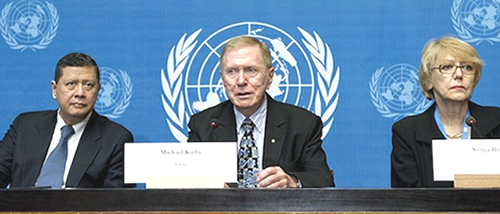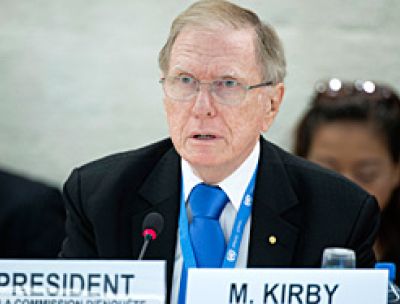On 21 March 2013, at its 22nd session, the United Nations Human Rights Council established the Commission of Inquiry on Human Rights in the Democratic People’s Republic of Korea (DPRK). Resolution A/HRC/RES/22/13 mandates the body to investigate the systematic, widespread and grave violations of human rights in the Democratic People's Republic of Korea, with a view to ensuring full accountability, in particular for violations which may amount to crimes against humanity.
Among the violations to be investigated are those pertaining to the right to food, those associated with prison camps, torture and inhuman treatment, arbitrary detention, discrimination, freedom of expression, the right to life, freedom of movement, and enforced disappearances, including in the form of abductions of nationals of other States.
In addition to establishing the Commission of Inquiry for one year, the resolution also authorized a one-year extension of the mandate of the Special Rapporteur on the situation of human rights in the Democratic People’s Republic of Korea, a post that was created in 2004 and currently filled by Mr. Darusman.
Through this decision the Council also urged the Government of the Democratic People’s Republic of Korea to ensure full, rapid and unimpeded access of humanitarian assistance and for the Government to cooperate fully with the Special Rapporteur and the commission of inquiry.
The same resolution requested that the commission present an oral update to the Human Rights Council at its twenty-fourth session in September 2013 and to the General Assembly at its sixty-eight session, and a written report to the Council at its twenty-fifth session in March 2014.
From 1 to 5 July 2013, the Commission of Inquiry on human rights in the DPRK began its operations in Geneva with key meetings that included a number of diplomatic missions, UN agencies, scholars and NGOs. The Commissioners also discussed the strategy, methodology and investigative approach they will employ during their mandate. They have written twice to DPRK representatives in Geneva to “seek engagement in a spirit of co-operation and transparency”. The response has so far been negative, but the Commissioners intend to continue to reach out to the Government of the DPRK and to seek its cooperation, given assurances that representatives of DPRK have previously given to the Human Rights Council that the DPRK “prioritizes human rights and honours the UN Charter and international human rights instruments.”
The Commission of Inquiry is mandated to look into “systematic, widespread and grave violations of human rights” in the Democratic People’s Republic of Korea, in particular:
- Violations of the right to food,
- Violations associated with prison camps,
- Torture and inhuman treatment,
- Arbitrary detention,
- Discrimination,
- Violations of freedom of expression,
- Violations of the right to life,
- Violations of freedom of movement, and
- Enforced disappearances, including in the form of abductions of nationals of other States.
The COI will conduct its investigation with a view to ensuring full institutional and personal accountability, in particular where violations may amount to crimes against humanity.
The COI will present a written report with its findings and recommendations to the Human Rights Council in March 2014. It will provide oral updates on its work to the Human Rights Council in September 2013 and to the General Assembly in October 2013.
Methods of work
The Commission of Inquiry will systematically collect and assess relevant information for its investigation and document victims’ testimonies, accounts of survivors and witnesses, including, where appropriate, through public hearings.
The Commission of Inquiry will conduct its investigation with a view to ensuring full institutional and personal accountability, in particular where violations may amount to crimes against humanity.
In carrying out its work, the Commission of Inquiry and its Secretariat staff will be guided by the principles of independence, impartiality, objectivity, transparency, integrity and the principle of “do no harm”, including in relation to guarantees of confidentiality and the protection of victims and witnesses.
The COI will collect and document victims’ testimonies and the accounts of survivors, witnesses and perpetrators, including, where appropriate, through public hearings.
It will seek the full cooperation of the Government of the Democratic People’s Republic of Korea and has issued a request to visit the country.
The COI will seek to develop regular dialogue and cooperation with the United Nations, including its specialized agencies, regional intergovernmental organizations, mandate holders, interested institutions and independent experts and non-governmental organizations.
Any state, individual or organisation can submit information in writing to the Commission (see contact details below).
In carrying out its work, the COI and its Secretariat staff will be guided by the principles of independence, impartiality, objectivity, transparency, integrity and the principle of “do no harm”, including in relation to guarantees of confidentiality and the protection of victims and witnesses.
Information Sheet
English | Japanese | Korean (PDF)


